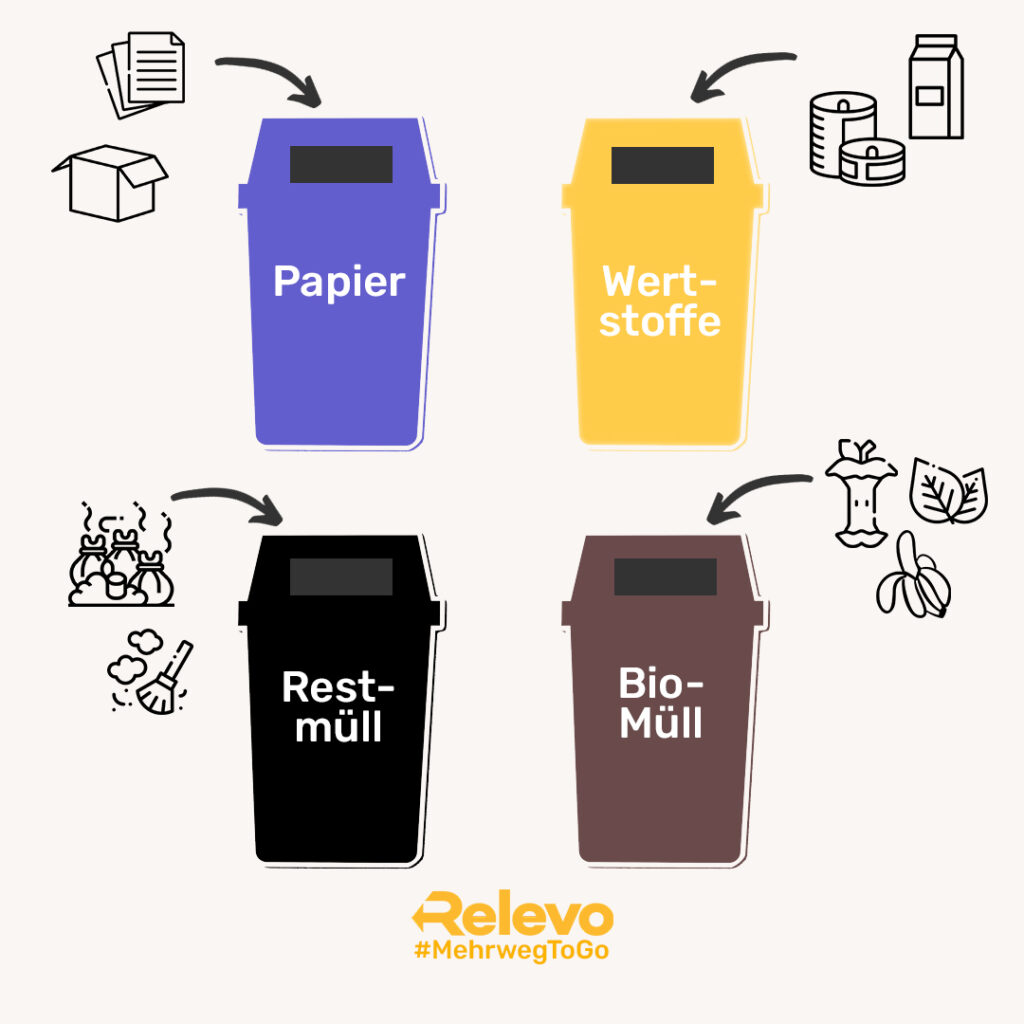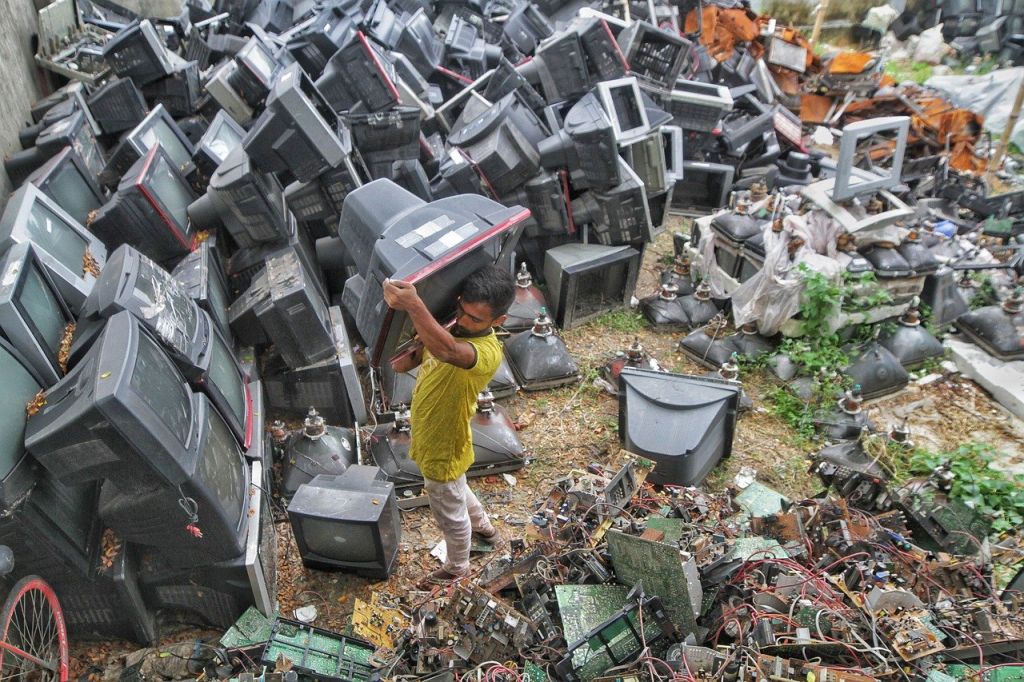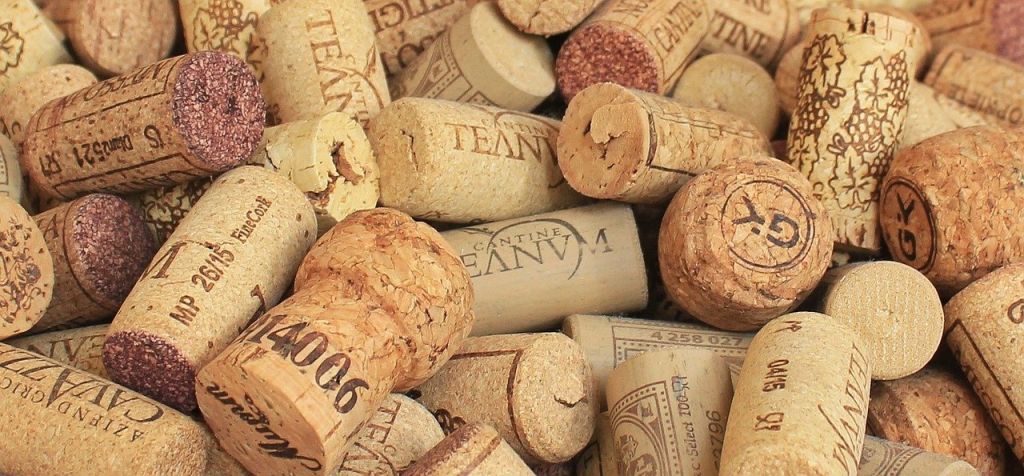WASTE SEPARATION & RECYCLING: HOW TO SEPARATE YOUR RUBBISH RIGHT!
HOW DO I SEPARATE WASTE CORRECTLY?
Most people try to separate waste correctly, but it’s not always that easy. The usual guidelines are generally known: plastic to plastic, paper to paper, and residual waste to residual waste. But what about the lid of the yoghurt pot? Or the one on the milk? What about the labels on tinned jars? Does anyone actually know where furniture and electronic waste ends up?
According to the Federal Statistical Office for Waste Management, around 38 million tonnes of waste were disposed of in Germany in 2019. That’s quite a lot. We wonder what percentage of this was collected separately. And what does sorting mean?
We hope everyone knows the spots in the city where the large containers are located, labelled with signs such as ‘Plastic’ or ‘Glass’. At the latest when you want to dispose of empty wine bottles.
For everyone, here is a brief overview of the basic principles:

Paper: Almost every second industrially felled tree worldwide is turned into paper – newspapers, magazines, wrapping paper, packaging, kitchen towels or toilet paper. According to the Federal Office for the Environment, 20 million tonnes of paper were consumed in Germany in 2018. And hopefully disposed of in the blue bin.
But what about drink cartons? They are made of cardboard, aren’t they? But it doesn’t actually belong in the paper waste as it is composite packaging. Tetra pack must therefore be disposed of in the yellow bin or the yellow bag.
And what about pizza boxes? It usually doesn’t look the same after the tasty Pizza Napoli as it did when the pizza was put in it. So unfortunately, soiled paper does not go in the waste paper bin either. What the blue bin also doesn’t like: receipts, wet-strength paper, wax paper, wallpaper, waxed paper, envelopes with plastic padding and carbonless paper.
Yellow Bin: This is probably the most loved and most hated bin in society. Why? In many large cities, landlords are not obliged to provide a yellow bin. These are located at certain places in the city, which are often not directly on the doorstep. For many, this can be a reason to dispose of plastic in the residual waste bin. However, if you separate it from other waste, plastic can be recycled and reused. This produces less waste overall and has less impact on the environment.
And what goes in the yellow bin? All packaging made of plastic, tinplate and aluminium. This includes, for example, film, plastic packaging for meat and cheese, tins, empty tubes, drinks cartons and plastic bags. To-go crockery such as polystyrene boxes can also be disposed of in it.
Residual Waste: Aka der Alles-Esser. Das ist die beliebteste Tonne. Wenn man nicht weiß wohin mit seinem Zeug, ab in die Restmüll Tonne. Doch was darf da tatsächlich rein? Wird alles richtig getrennt, bleibt für die Restmülltonne nicht mehr viel übrig. Hier hinein gehören z.b Asche, Tierkot und Streu, verschmutzte Papiere, Hygieneartikel, Windeln, Staubsaugerbeutel, defekte Glühbirnen, ausgetrocknete Filzstifte, Zigarettenkippen, alte Fotos, zerbrochenes Porzellan oder Glas.
Organic Waste Bin/Compost: Composting waste can be a bit of a challenge. The organic waste bin has not really found its place yet. Many people are put off by the odour or the small animals it attracts.
All organic waste, such as plant residues and garden waste, fruit and vegetable waste, but also coffee and tea filters, ends up in the brown bin. But why compost? Compost returns nutrients and organic substances to the soil. At the same time, it improves the structure and aeration of the soil. It’s a way to give something back to our soil. But no plastic, please! Important: whether meat or fish scraps are allowed in the organic waste bin depends on the local authority’s regulations. Just have a look.
Glass: Now it’s easy. Blue, red and black glass belong to green glass. White (transparent) belongs to white glass. Brown belongs to brown glass. The lids do not need to be unscrewed. It couldn’t be easier!
UND JETZT WIRD ES SPANNEND!
Electronic waste: We try to keep it short here. If you haven’t heard of Agbogbloshie (Ghana) or Guiyu (China) yet, you should google it. Please, please, please dispose of e-waste properly. This means not having it collected free of charge by some internet provider. These must either be handed in at municipal collection points, recycling centres or retailers. This also applies to fluorescent lamps and LEDs.

Hazardous Waste: Products with harmful ingredients must not be thrown into the residual waste bin. Harmful substances could be released into the environment. This includes renovation waste, cleaning products, spray cans that have not been completely emptied, garden chemicals with hazardous substance symbols and thermometers containing mercury. You can dispose of hazardous waste in normal household quantities free of charge at municipal collection centres. Furthermore, retailers are obliged to take back certain products containing hazardous substances (e.g. old batteries and rechargeable batteries, as well as used oil). I have to admit that I have also stood in front of the yellow bag with an empty aerosol can. How can we help each other in future to pay more attention to waste separation?
Old Clothes: There are collection points for this, either in the form of containers or organisations such as Diakonie in Munich. These organisations are not only environmentally friendly, but also socially responsible. Because the clothes go to people in need, both at home and abroad. Parishes are good contacts here. Further information on clothes banks can be obtained from the waste advice centre.

Cork Stoppers: The beautiful wine corks are actually a sought-after raw material, as the cork oak forests are unfortunately heavily overused. Recycled corks are used to make organic insulation materials and floor coverings. You can hand them in at recycling centres or wine merchants.

Conclusion
Waste separation is pretty important to us at Relevo. If you don’t do it, you harm the environment and ultimately yourself. After all, who wants to live in a polluted city? It really isn’t much to ask to go the extra mile. If you think about how much time you spend on other things, an hour a week or a month to look at recycling centres or bins for plastic and glass really isn’t much. You are more likely to separate if you are prepared. We should always bear in mind and be pleased that we have a waste management system at all. We are privileged and should be grateful.
